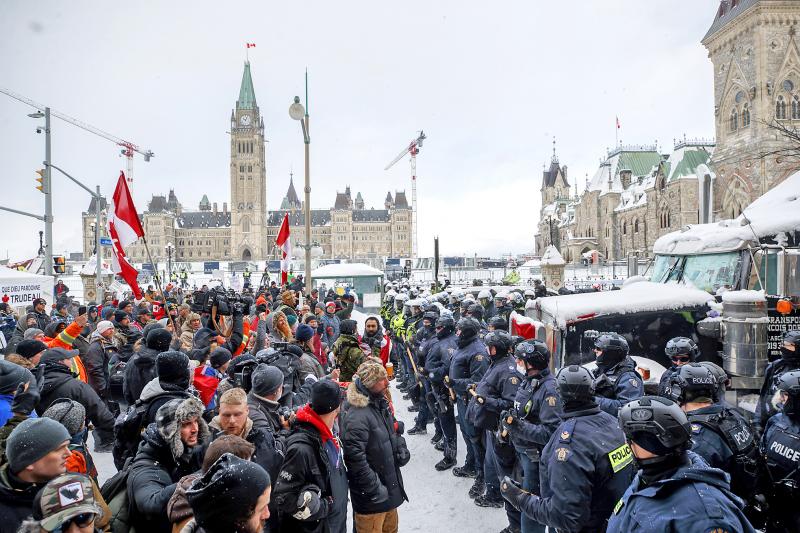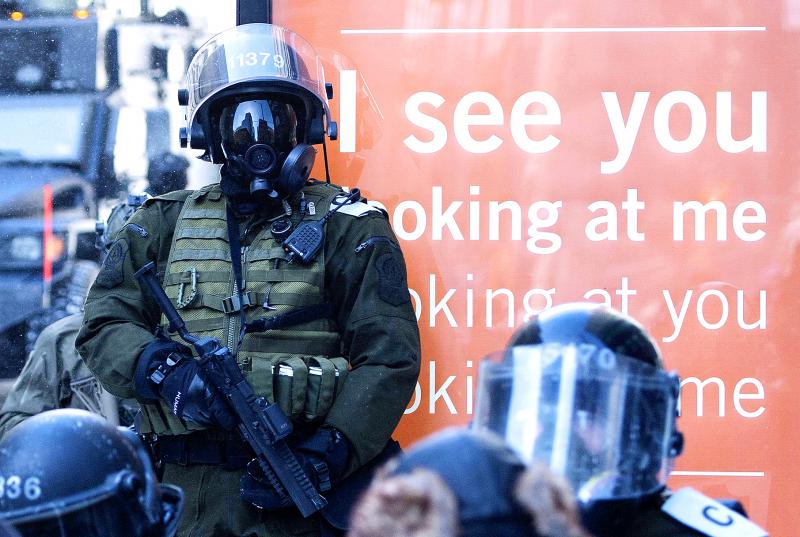Canadian police were yesterday making possibly the final push to clear the capital city of demonstrators who have paralyzed it by parking and camping on the streets for more than three weeks to protest against COVID-19 pandemic restrictions.
Police have made 170 arrests and towed 53 vehicles since they began efforts to bust up the protest on Friday morning that required Canadian Prime Minister Justin Trudeau to invoke rarely used emergency powers.
On Saturday, police used pepper spray and stun grenades to move out the die-hard protesters who have remained, clearing most of the area in front of parliament and next to the prime minister’s office.

Photo: AP
However, pockets of entrenched protesters still remain.
Some of those arrested on Saturday wore body armor, and had smoke grenades and other fireworks in their bags and vehicles, police said.
“This operation is still moving forward. It is not over and it will take more time until we have achieved our goals,” Ottawa Interim Police Chief Steve Bell said on Saturday.

Photo: AP
The protesters initially wanted an end to cross-border COVID-19 vaccine mandates for truck drivers, but the blockade turned into a demonstration against Trudeau and the government.
Trudeau on Monday last week invoked emergency powers to give his government wider authority to stop the protests, including sweeping powers to freeze the accounts of those suspected of supporting the blockades, without obtaining a court order.
“Police are making their way through the streets methodically and responsibly. This is encouraging, but the work is not yet done,” Canadian Minister of Public Safety and Emergency Preparedness Marco Mendicino said on Saturday.
Protesters, who have been filmed by police, would be held accountable, Bell said.
“We will actively look to identify you and follow up with financial sanctions and criminal charges... This investigation will go on for months to come,” he said.

MONEY GRAB: People were rushing to collect bills scattered on the ground after the plane transporting money crashed, which an official said hindered rescue efforts A cargo plane carrying money on Friday crashed near Bolivia’s capital, damaging about a dozen vehicles on highway, scattering bills on the ground and leaving at least 15 people dead and others injured, an official said. Bolivian Minister of Defense Marcelo Salinas said the Hercules C-130 plane was transporting newly printed Bolivian currency when it “landed and veered off the runway” at an airport in El Alto, a city adjacent to La Paz, before ending up in a nearby field. Firefighters managed to put out the flames that engulfed the aircraft. Fire chief Pavel Tovar said at least 15 people died, but

LIKE FATHER, LIKE DAUGHTER: By showing Ju-ae’s ability to handle a weapon, the photos ‘suggest she is indeed receiving training as a successor,’ an academic said North Korea on Saturday released a rare image of leader Kim Jong-un’s teenage daughter firing a rifle at a shooting range, adding to speculation that she is being groomed as his successor. Kim’s daughter, Ju-ae, has long been seen as the next in line to rule the secretive, nuclear-armed state, and took part in a string of recent high-profile outings, including last week’s military parade marking the closing stages of North Korea’s key party congress. Pyongyang’s official Korean Central News Agency (KCNA) released a photo of Ju-ae shooting a rifle at an outdoor shooting range, peering through a rifle scope

South Korea would soon no longer be one of the few countries where Google Maps does not work properly, after its security-conscious government reversed a two-decade stance to approve the export of high-precision map data to overseas servers. The approval was made “on the condition that strict security requirements are met,” the South Korean Ministry of Land, Infrastructure and Transport said. Those conditions include blurring military and other sensitive security-related facilities, as well as restricting longitude and latitude coordinates for South Korean territory on products such as Google Maps and Google Earth, it said. The decision is expected to hurt Naver and Kakao

Australian Prime Minister Anthony Albanese yesterday said he did not take his security for granted, after he was evacuated from his residence for several hours following a bomb threat sent to a Chinese dance group. Albanese was evacuated from his Canberra residence late on Tuesday following the threat, and returned a few hours later after nothing suspicious was found. The bomb scare was among several e-mails threatening Albanese sent to a representative of Shen Yun, a classical Chinese dance troupe banned in China that is due to perform in Australia this month, a spokesperson for the group said in a statement. The e-mail